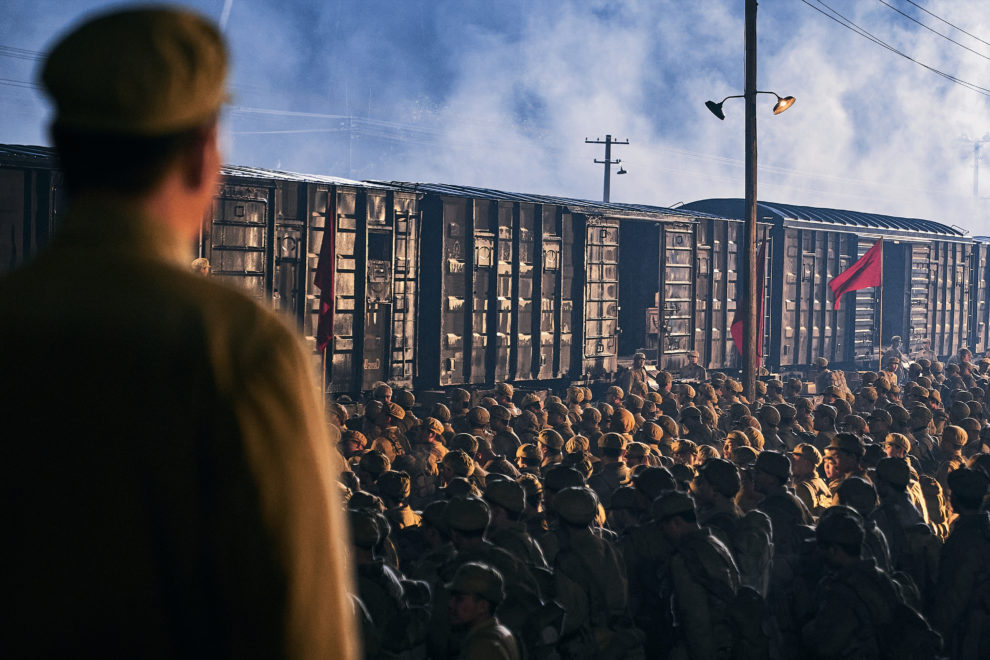About 40 minutes into “The Battle at Lake Changjin,” a Chinese comrade aboard a train headed to the China-North Korea border expresses his skepticism regarding the Chinese effort in the Korean War of 1950. “I quit,” he yells, opening the railwagon door. Two other comrades detain him, and soon, everyone on board is mesmerized by the beautiful homeland of China and its Great Wall. Company commander Wu Qianli addresses his brother: “You will stay here as your punishment until the morning.”
This is only one of the countless patriotic scenes that “The Battle of Lake Changjin” has to offer, and given that it was funded by the propaganda department of the Chinese Communist Party to celebrate the Party's 100th anniversary, the patriotism is no surprise. With a budget worth more than $200 million USD and directorial credits given to Tsui Hark, Chen Kaige and Dante Lam–arguably three of the greatest filmmakers in Chinese cinema–the movie is certainly an epic and ambitious undertaking.
And for the most part it delivers, despite having its biases. A caption at the film's beginning explains that American General Douglas MacArthur “announced war on North Korea” in July of 1950, but makes no mention of the North Korean invasion of South Korea the month prior; Mao Zedong is depicted as an honorable and stoic hero as he sends the Chinese troops off to battle; the soldiers in the American military are portrayed as indulgent, confident and careless as they gamble with the lives of Chinese fighters. While it is clear that the true war story in “The Battle at Lake Changjin” is told through a filter, it is fun spending the movie's three hour runtime trying to pick it apart and contemplate its elements.
“The Battle at Lake Changjin” appears more to be about the telling of a larger-than-life story and less about the people involved; much like an actual military group, the small moving parts are meaningless individually and work to serve the overarching whole. However there are still a handful of noteworthy performances, including Wu Jing as company commander Wu Qianli, Jackson Yee as the commander's brother (and brother-in-arms), and James Filbird as a disgruntled and authoritative General MacArthur.
But more than anything, “The Battle at Lake Changjin” is really about the spectacle of multi-million dollar pyrotechnics, daunting expanses filled with fighters and rubble, and a ton of intricate computer-generated imagery (CGI). Apart from being sublime during its most riveting moments, the film is beautiful in its calmer ones; the thoughtful attention to color and lighting is clear, and the movie's aesthetic is well-defined. Viewers are taken on a journey of greens, browns and yellows through rural China, and whites and blues as the comrades approach snowier and less forgiving territory while making their way towards the battlefield.
It would be foolish to deny that “The Battle at Lake Changjin” is nationalist propaganda in a similar vein as titles like “Black Hawk Down” and “American Sniper.” The difference might seem jarring to Western viewers, but it isn't: After all, countless major film titles have received funding from America's Department of Defense, with “Black Hawk Down” being an obvious example but a plethora of Marvel movies and the “Transformers” trilogy being more subtle ones.
Despite its nationalist messaging, “The Battle at Lake Changjin” is chock-full of massive explosions, gripping action sequences, realistic CGI and beautiful cinematography. For viewers around the world, it will be both entertaining and interesting to see the Chinese version of heroism during this momentous time in history.
















